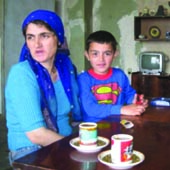Lack of food threatens to drive family apart again
By Ana Chkhaidze with World Vision Georgia
Friday, July 4

Marina, husband Badri, and their children live in a suburb of Tbilisi, the capital of Georgia, in a two room flat with five beds. Inside, a stark lack of furniture and signs of poverty are the first things you notice as you enter the room.
There isn’t enough space to hold the children’s clothes and not enough beds and chairs to go around, yet the family is together and they are grateful for this small haven, which they rent with the support of World Vision and a small government allowance of GEL 280 (USD150).
The future looks bleak, but times have been even tougher in the past. Now the rising cost of living and increased food prices are threatening to drive the family apart again.
Two years ago, before receiving help from World Vision, the Psitidzes struggled to find rent money every month, and feed their growing children.
Marina’s husband worked as a security guard, earning a monthly income of GEL 150 (USD 80). They would spend GEL 90 of that income on bread alone and the rest had to cover rent. Their meager diet consisted of bread and tea.
“Sometimes we could not buy bread and the children went hungry all day,” recalls Marina.
When the money ran out, Marina and Badri felt the only way they could provide for their children’s basic needs was to place them in a children’s institution. In Georgia, 90 percent of children in institutions have parents.
“I made the hardest decision of my life—taking my children to the ‘orphanage’ was the only solution for us otherwise they would die of hunger,” says Marina.
“I lived there a year. I hate thinking of that time. I thought my parents left us there and we would never see them again. I cried all the time,” says 13-year-old Giorgi.
Living in their ‘own’ house has eased the situation but the income is still not enough for the family.
“We manage to feed our children twice a day, but sometimes they go to bed on an empty stomach,” says Badri.
Today a Georgian family of this size needs about GEL 350 to live on. In 2004 the figure was GEL 226.
Inflation and rising global food and energy prices are hitting already vulnerable Georgian families the hardest.
The prices of bread and wheat flour have risen 33 and 32 percent and the price of maize flour has risen 50 percent.
Milk and cheese prices are rising and even aligning, whereas in the past cheese was always more expensive. Sunflower oil, used widely by Georgians, has also increased by 65 percent, which also reflects the strong dependence of product prices on international market prices.
“Georgia as an agrarian country is presently utilizing only a small percentage of its agricultural potential due to a lack of modern production technologies, lack of modern storage, post harvest handling, and perhaps most significant, the lack of information about the markets and market prices, which makes production and trade decisions both difficult and risky,” says Vano Grigolashvili, World Vision Livelihood Development and Emergency Response Program Manager.
While the Psitidze family is presently coping with the help of neighbors, the government allowance and World Vision, the threat of having to abandon their children to an institution looms fiercely for this family and for thousands like it across Georgia and Eastern Europe.
Children most of all will pay the social cost of the crisis with their very lives.
